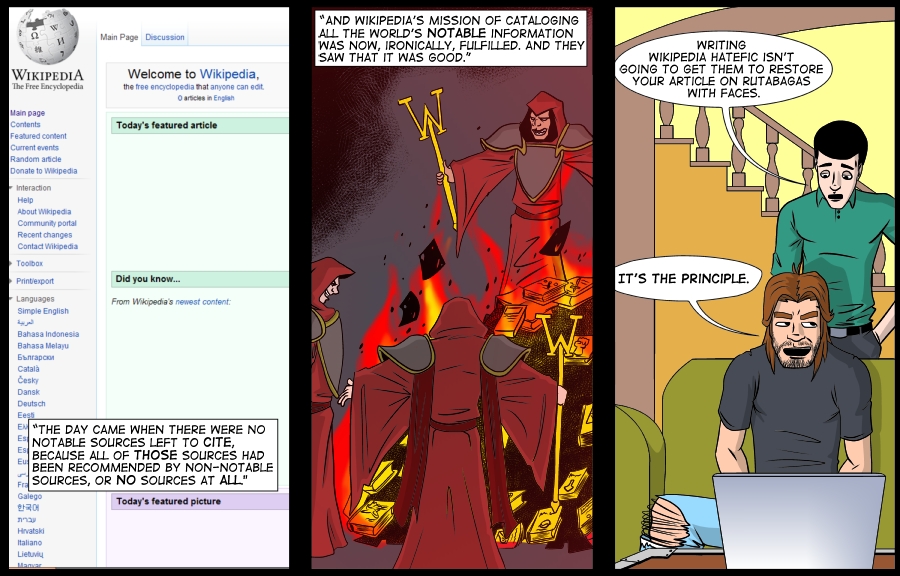Hatefic
« previous post | next post »
The strip's left panel links to "Active discussions" on Wikipedia's Deletion_review page, with a mouseover title of "…". The middle panel links to the Association of Deletionist Wikipedians, with a mouseover title of "Honestly, you have to wonder how serious this is, sometimes". And the right panel links to a picture of a "traditional Irish halloween Jack-o'-lantern", with a mouseover of "Let's see if this link gets anything deleted".
There are articles on hatefic at tvtropes and at fanlore (well, under the name of "Character bashing"), but nothing on wikipedia.

Emily said,
July 23, 2011 @ 1:34 pm
-"fic" compounds are pretty common in fandom, and I think it's a productive pattern. There's "slashfic" (e.g. Strunk/White), "spitefic," (similar in meaning to "hatefic"), "trollfic," (written by Internet trolls to offend/annoy people), and "(name)fic," where the name is that of a character.
Sili said,
July 23, 2011 @ 2:36 pm
Ah. So Strunk/White* is the slashfic and Strunk&White is the hatefic?
* White is sooo a bottom as evidenced by his salivating over Strunk in the last post on the subject.
Lazar said,
July 23, 2011 @ 3:40 pm
I don't understand what the first panel is saying.
Ray Girvan said,
July 23, 2011 @ 3:51 pm
@ Lazar: it's a caricature – a reductio ad absurdum – of Wikipedia's requirement for citation by notable sources. The reality is that citation isn't required for that which is generally known: but if you ignored that, generally known material could be rejected as unsourced, and even sourced material rejected because no 'downstream' source demonstrated its notability … eventually leading to all information being rejected as improperly sourced.
jfruh said,
July 23, 2011 @ 4:04 pm
I've heard "foefic" used as the opposite of "fanfic", i.e., fiction written about pre-existing fictional characters or universes that the foefic writer dislikes.
Charles said,
July 23, 2011 @ 4:28 pm
@Ray Girvan: The prescriptivist in me says that your use of "reductio ad absurdum" is incorrect. I haven't really noticed it before but I can see why people might use it that way, just as people use "beg the question" to mean something like "prompt the question". I think Language Log discussed that one recently but I can't find an article on the misuse of reductio ad absurdum – has anyone written about it?
John said,
July 23, 2011 @ 5:19 pm
I'm sure there's some principle of epistemology that any statement has to be ultimately based either on generally agreed first principles, circular logic, or infinite regression. So in other words, if you don't set some standard of basic knowledge we can all agree on, you could keep asking "why?" (or indeed "says who?") forever.
T Campbell said,
July 29, 2011 @ 4:49 pm
I'm late to this particular party, but this might be of some interest to Language Loggers.
I agree with John and have to disagree with Ray. "What is generally known" is not so easy to agree upon, and Descartes proved that it's possible to declare virtually everything in the universe "non-notable," if we put our minds to it. Now, my view of Wikipedia is more nuanced than that of this hatefic writer, but that is one possible extreme.
I encountered the term "hatefic" when someone wrote a story about the characters in Penny and Aggie, another of my comics. Let's just say the author made his/her distaste for me and my characters clear. By humiliating and killing us.